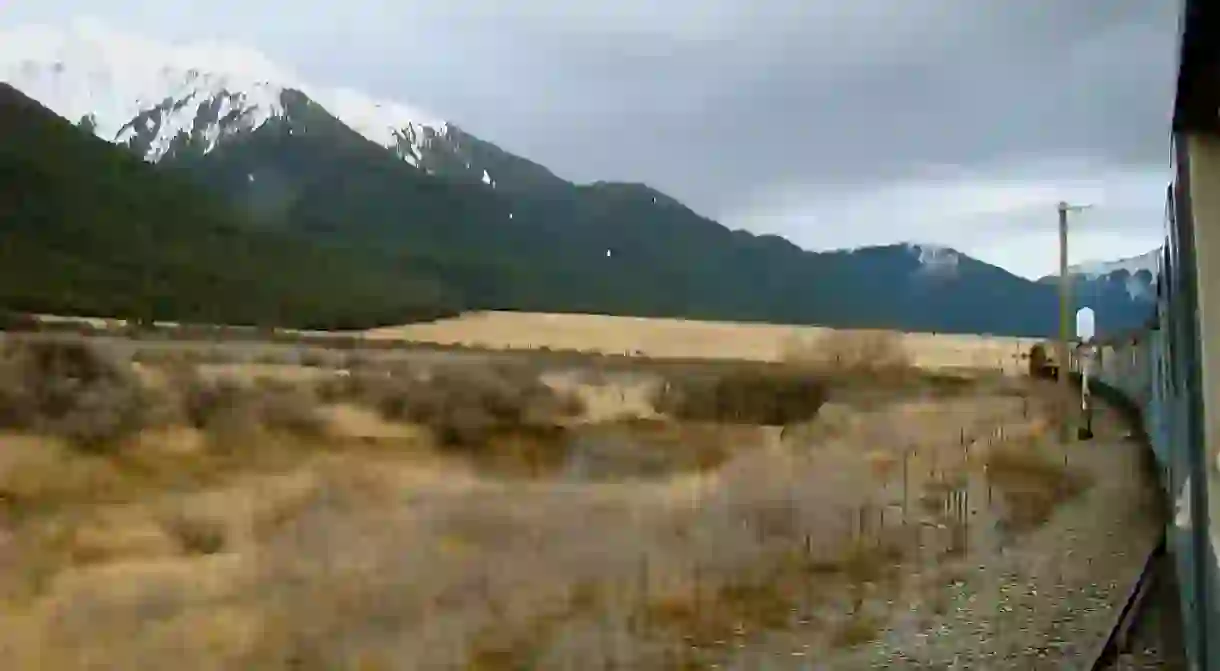11 Awesome Facts About the TranzAlpine Railway

The TranzAlpine Railway journey from Christchurch to Greymouth is among the world’s most scenic. With a vast array of natural treasures to share, the train enables its passengers to relish the South Island’s remarkable geographic diversity at a leisurely pace. Whether you’re looking for some travel inspiration or you’ve got your sights set on this beautiful ride, here are 11 interesting facts about New Zealand’s most iconic rail route.
The TranzAlpine celebrated its 30th anniversary in 2017
22 November 1987 was the date of its first departure from Christchurch. To mark its 30th anniversary, operator KiwiRail organised a special trip for train staff, key tourism industry figures as well as members of the public – celebrations included a birthday cake and musical performances by the New Zealand Symphony Orchestra as passengers hopped on board.

Since its first journey in 1987, the train has travelled more than 5 million kilometres (3.1 million miles)
Each individual TranzAlpine run covers a total of 223 kilometres (139 miles), traversing some spectacular countryside and alpine terrains along the way – it is these backdrops that make the ride so appealing.
The train travels inland, going east to west
It’s a daily route that departs from Christchurch in the morning, arrives in Greymouth in the afternoon and takes a quick one-hour breather before making its way back to its starting location. Passengers on the Greymouth-Christchurch trajectory will reach their final destination just in time for dinner, at around 6.30pm.

The TranzAlpine has welcomed quite a few celebrities
Famous passengers to have boarded the train over the years include Kate Winslet, John Travolta, several All Blacks rugby players as well as Bart and Homer Simpson, who travelled to the Canterbury town of Springfield on the TranzAlpine for the worldwide launch of The Simpsons Movie.
The train travels through two railway lines
It begins its journey on the Main South Line, from Christchurch into the Canterbury Plains and into Rolleston, before meandering into the Midland Line which connects the Canterbury region to the West Coast.

During the trip, the TranzAlpine passes through 16 tunnels…
The longest of which is the 8.5-kilometre (5.3-mile) Otira Tunnel, an iconic structure which marked the completion of the Midland Line and was also the second-largest tunnel in the world upon its construction in 1923.
…And four separate viaducts
The longest among them is the Staircase Viaduct, which carries the rails 72 metres (236 feet) above the stream bed as the TranzAlpine makes its ascent over the Waimakariri River gorge and into the elevated plains of Craigieburn.

Its first open-air platform debuted in 1991
The open carriage proved to be so popular that a handful of other upgrades soon followed: including the addition of eight new cars with full panoramic windows in 1994-1995, plus extensions to the open-viewing platform in 1995 and 1998 respectively.
Arthur’s Pass is one of the most photographed points on the TranzAlpine route
Other photo-op favourites include the Canterbury locality of Cass and Lake Sarah, a high country lake near Craigieburn.

Some 55,000 passengers arrive into Greymouth via the TranzAlpine route each year
In fact, the railway journey is said to bring an annual tourism revenue of NZ$15 million to the West Coast region at large.
There’s a bid to expand the TranzAlpine into the West Coast town of Hokitika
Hokitika is located 40 kilometres (24.9 miles) south of Greymouth which, alongside featuring a picturesque gorge known to attract quite a few visitors, is a key stopover point for travellers heading to notable West Coast attractions such as the Fox and Franz Josef Glaciers. In late 2017, local officials started campaigning for the TranzAlpine route to be extended into Hokitika, arguing that the infrastructure for it already exists and the town will offer a ‘more tourist-friendly’ experience to the region’s visitors.














